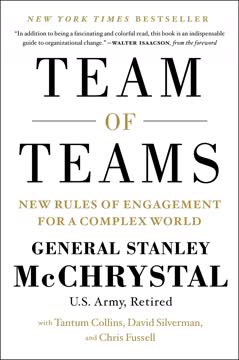Key Takeaways
1. Scaling is a ground war, not just an air war
"Scaling unfolds with less friction and more consistency when the people propelling it agree on what is right and wrong—and on what to pay attention to and what to ignore."
Mindset matters. Scaling excellence requires more than just expanding numbers or footprint. It demands a shared mindset throughout the organization about what's important and how to behave. This mindset acts as a compass, guiding decisions and actions at all levels.
Ground-level effort. Successful scaling involves grinding it out on the ground, making small changes in beliefs and behaviors across the organization. It's not enough to simply broadcast directives from the top. Leaders must be willing to engage in the day-to-day work of implementation, addressing challenges as they arise.
Perseverance is key. Scaling is a marathon, not a sprint. It requires grit and persistence to overcome inevitable setbacks and maintain momentum over time. Organizations that succeed in scaling up excellence demonstrate relentless dedication to their goals, even when progress seems slow or obstacles arise.
2. Balance between "Buddhism" and "Catholicism" in scaling approaches
"The key challenge, then, is knowing when to add more complexity, when it is 'just right,' and when to wait a bit longer."
Flexibility vs. standardization. Successful scaling requires striking a balance between allowing local adaptation ("Buddhism") and enforcing strict replication ("Catholicism"). Neither extreme is typically effective on its own.
Context matters. The right approach depends on the specific situation, industry, and organizational culture. Some elements may need to be standardized for consistency, while others benefit from customization to local needs.
Guardrails, not straightjackets. Effective scaling often involves setting a few key "guardrails" or non-negotiable elements, while allowing flexibility within those boundaries. This approach provides necessary structure without stifling innovation or local problem-solving.
3. Link hot causes to cool solutions to drive scaling
"Scaling depends on believing and living a shared mindset throughout your group, division, or organization."
Emotion drives action. To scale effectively, organizations need to connect emotionally compelling "hot causes" with practical "cool solutions." This combination motivates people to change behavior and sustain new practices.
Storytelling and symbols. Leaders can create hot causes through powerful storytelling, vivid symbols, and shared experiences that generate strong emotional responses. These elements help make the scaling effort feel meaningful and urgent.
Practical implementation. Cool solutions provide the concrete steps and tools needed to turn emotional energy into sustainable change. They translate inspiration into action, ensuring that enthusiasm leads to real results.
4. Reduce cognitive load while managing necessary complexity
"As organizations and programs expand and age, they often propagate ever more convoluted procedures and processes."
Simplify where possible. As organizations grow, they tend to accumulate unnecessary rules, processes, and complexity. Effective scaling requires constantly looking for ways to reduce this cognitive burden on employees.
Focus on essentials. Identify and prioritize the most critical elements that need to be scaled. Eliminate or postpone less essential components to maintain focus and prevent overwhelm.
Manage necessary complexity. Some complexity is unavoidable as organizations grow. The key is to handle it thoughtfully, providing clear guidance and support to help people navigate more complex systems and interactions.
5. Build accountability and ownership throughout the organization
"Accountability means that an organization is packed with people who embody and protect excellence (even when they are tired, overburdened, and distracted), who work vigorously to spread it to others, and who spot, help, critique, and (when necessary) push aside colleagues who fail to live and spread it."
Foster personal responsibility. Create a culture where individuals feel personally accountable for upholding and spreading excellence, regardless of their role or level in the organization.
Balance autonomy and alignment. Give people the freedom to make decisions and solve problems within the framework of shared goals and values. This empowers them while ensuring alignment with organizational objectives.
Address underperformance. Be willing to confront and address behaviors that undermine excellence. This may involve coaching, reassignment, or, in some cases, removing individuals who consistently fail to meet standards.
6. Connect people and cascade excellence through social bonds
"Excellence flows from one person, team, or place to the next—much like those 'domino chains,' where the energy generated by one falling domino creates the energy to topple the next, and then the next, and so on, until all have fallen."
Leverage social networks. Identify and engage key influencers and connectors within the organization to help spread new practices and mindsets. These individuals can serve as bridges between different groups or departments.
Create opportunities for interaction. Foster formal and informal connections between people to facilitate the spread of knowledge and best practices. This might include cross-functional teams, mentoring programs, or social events.
Encourage peer-to-peer learning. Establish systems that allow employees to learn from each other's successes and failures. This can accelerate the scaling process and reinforce desired behaviors.
7. Eliminate bad behaviors to clear the way for excellence
"Bad is stronger than good."
Address negative behaviors quickly. Negative actions and attitudes can have a disproportionate impact on organizational culture and performance. Swift action to address these issues is crucial for successful scaling.
Set clear expectations. Clearly communicate what behaviors are unacceptable and why. This helps prevent misunderstandings and establishes a shared standard of conduct.
Create positive alternatives. Don't just focus on eliminating bad behaviors; provide clear guidance and support for positive alternatives. This helps people understand not just what not to do, but what they should do instead.
Last updated:
FAQ
What's Scaling Up Excellence about?
- Focus on Scaling Success: Scaling Up Excellence by Robert I. Sutton and Hayagreeva Rao explores how organizations can spread successful practices and behaviors from small pockets of excellence to their entire structure.
- The Problem of More: It introduces the "Problem of More," highlighting the challenges of maintaining quality and effectiveness while scaling operations.
- Practical Framework: The book provides a framework with principles and strategies for leaders to scale effectively, supported by case studies and research.
Why should I read Scaling Up Excellence?
- Essential for Leaders: It's a must-read for entrepreneurs, CEOs, and nonprofit executives aiming to drive growth without stagnation.
- Rich with Examples: The authors use vivid examples and deep research to make complex concepts accessible and relatable.
- Addresses Common Challenges: It tackles the pervasive problem of maintaining excellence while growing, offering insights to navigate scaling pitfalls.
What are the key takeaways of Scaling Up Excellence?
- Ground War Mindset: Scaling requires engaging deeply with teams and processes, not just relying on high-level strategies.
- Buddhism vs. Catholicism: Successful scaling often requires balancing local adaptation with strict adherence to established practices.
- Seven Scaling Mantras: These include "Spread a mindset, not just a footprint" and "Slow down to scale faster—and better—down the road."
What are the best quotes from Scaling Up Excellence and what do they mean?
- “Scaling is a problem of more and of less.”: Scaling involves increasing numbers while reducing unnecessary complexity.
- “The job of the hierarchy is to defeat the hierarchy.”: Leaders must create systems that empower employees rather than constrain them.
- “I own the place and the place owns me.”: This reflects the ideal mindset of accountability and commitment employees should have.
What is the "Problem of More" in Scaling Up Excellence?
- Definition of the Problem: It refers to the challenge of spreading excellence from small pockets to the entire organization.
- Common Obstacles: Issues like cognitive overload and resistance to change can lead to mediocrity if not addressed.
- Strategies to Overcome: Focus on both "more" and "better" by enhancing quality while expanding reach.
How do the authors define "scaling" in Scaling Up Excellence?
- Scaling as a Process: It's about spreading successful practices and behaviors throughout an organization.
- Importance of Mindset: Scaling is as much about mindset as it is about processes, requiring a shared mindset aligned with goals.
- Balancing Complexity: Simplifying processes and reducing cognitive load are crucial for maintaining performance and morale.
What are the seven scaling mantras mentioned in Scaling Up Excellence?
- Spread a Mindset: Focus on instilling a shared mindset rather than merely expanding the physical presence.
- Engage All the Senses: Use sensory cues to reinforce desired mindsets and behaviors.
- Link Short-Term to Long-Term: Connect daily tasks with the organization's long-term vision to maintain motivation.
How does Scaling Up Excellence suggest organizations can maintain excellence while scaling?
- Focus on Core Values: Clearly define and communicate core values to maintain a consistent culture.
- Empower Employees: Encourage ownership and accountability at all levels.
- Implement Feedback Loops: Establish mechanisms for regular feedback to identify areas for improvement.
What role does leadership play in scaling up excellence according to Scaling Up Excellence?
- Setting the Vision: Leaders articulate a clear vision and direction aligned with core values.
- Modeling Behavior: Effective leaders model desired behaviors and mindsets.
- Creating a Supportive Environment: Provide resources, training, and opportunities for growth and development.
How can organizations effectively deal with cognitive load during scaling according to Scaling Up Excellence?
- Simplify Processes: Strive to simplify processes and reduce unnecessary complexity.
- Use Load Busters: Implement tools and technologies to manage cognitive load.
- Encourage Breaks: Promote a culture that values breaks and downtime for better decision-making.
What specific methods or advice does Scaling Up Excellence offer?
- Premortem Technique: Teams imagine future failures to identify potential causes and develop strategies to avoid them.
- Guardrails for Scaling: Establish constraints to guide teams and maintain focus on core objectives.
- Nip It in the Bud: Address small issues before they escalate into larger problems.
How does Scaling Up Excellence suggest dealing with bad behavior in organizations?
- Immediate Action: Address bad behavior promptly to prevent it from spreading.
- Creating a Supportive Environment: Encourage a culture of support and learning to facilitate behavior improvement.
- Removing Bad Apples: Remove individuals who consistently engage in destructive behavior to protect the overall culture.
Review Summary
Scaling Up Excellence receives mostly positive reviews, with readers praising its practical advice and real-world examples. Many find it useful for business growth and organizational improvement. Critics note that the book can be repetitive and poorly organized at times. Some readers appreciate the emphasis on accountability and mindset, while others find the content similar to other business books. Overall, reviewers consider it a valuable resource for leaders and managers seeking to scale their organizations effectively.
Similar Books








Download PDF
Download EPUB
.epub digital book format is ideal for reading ebooks on phones, tablets, and e-readers.






